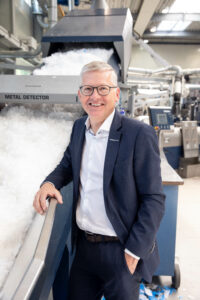“Recyclates from chemical recycling will be more expensive than virgin material”
Interview with Manfred Hackl (CEO) and Klaus Lederer (Business Development Manager) of Erema Group
Mechanical recycling processes have already matured. Chemical recycling is comparatively young. But will it be able to establish itself?

Klaus Lederer: There is every indication that it will, and the demand is certainly there. The big brands need solutions for their packaging, public pressure is increasing, and the EU’s recycling targets are very high. Chemical recycling could possibly make a contribution in that regard; however, some open questions remain. One challenge is, for example, to have the correct input material in the correct quality and quantity at the correct location. Some chemical recyclers will be able to solve this problem, others will not. It is also not clear at present whether chemical recycling will make sense economically. Those who expect recyclates from chemical recycling to be cheaper than virgin material will be disappointed. However, if you consider it a valuable factor to keep the raw material in the cycle at least, even if it is expensive and energy-intensive, it can still make sense. There are also currently multiple pros and cons concerning the question of whether chemical recycling benefits the environment. For a more accurate assessment of chemical recycling, we will have to wait until the first truly commercial plants are up and running.
Some say chemical recycling consumes much more energy than mechanical recycling, others disagree. What is your view?
Klaus Lederer: It’s a question of perspective. If you say that plastic is an energy carrier, and a large part of the required process energy can come from the plastic itself, then the energy consumption is lower than often claimed. But if you take into account that much more energy has to be put into it than in mechanical recycling, for example to fuel the pyrolysis process, and if you consider that afterwards you are right back at the beginning of the value chain, namely with synthetic crude oil, which then has to be processed again using energy, the claim that chemical recycling does not consume that much more energy than mechanical recycling cannot be upheld.
Manfred Hackl: An honest process analysis would immediately show quite clearly that the energy input is higher in chemical recycling. In mechanical recycling, a temperature of 250 degrees is needed for washing and extrusion. After that you have finished regranulate. In chemical recycling, the energy required for breaking down the raw material into its basic chemical components and then merging the components is many times higher.

A lot of research is being done in mechanical recycling to constantly improve recyclate qualities. Won’t the research become obsolete if all the raw materials are broken down into their original components in chemical recycling anyway?
Hackl: We don’t see it that way at all. In the last few years, a lot has happened in mechanical recycling, also because the entire industry is developing many things jointly. This has made it possible to realise solutions that were unimaginable just a few years ago. The quality of the re-granulate now allows for very demanding applications. In addition, mechanical recycling is already a functioning business model that makes sense ecologically and economically. It is both efficient and scalable. That’s why I don’t see why the development of mechanical recycling should rendered obsolete by chemical recycling. We will also see further developments within mechanical recycling. At Erema, for example, we are opening our new research and development centre for mechanical recycling at our headquarters in Ansfelden in June – a 10 Million-Euro investment. However, chemical recycling has its justification for certain material streams that mechanical recycling is not suitable for.
What division of duties would then make sense in the future from your point of view?
Lederer: The goal must be for the two technologies to complement each other; and in such a way that chemical recycling processes those materials that cannot be recycled mechanically. These are, for example, mixed plastics such as multi-layer films or fibre-reinforced plastics – or also such material that is intended to come into contact with food as an end product later. If chemical recycling manages to process the poorer quality materials and bring them into a cycle, then this would be a valuable addition. The division of duties would then be to avoid waste. If that isn’t possible, mechanical recycling will come in, and only when that reaches its limits will chemical recycling get a chance. This hierarchy makes sense because chemical recycling is more expensive and energy-intensive. At Erema, we try to support chemical recyclers with our extrusion technology so that they can reliably and energy-efficiently bring potentially difficult-to-handle material streams into their chemical recycling process. In this way, we are making an important contribution to developing chemical recycling to the point where it can ultimately be a real complement to mechanical recycling.
So Erema serves both processes with its recycling machines. Where do you see the potentials for each?
Hackl: We already offer the entire process technology for the mechanical treatment. Based on the strong increase in demand in the last two years, we can see how dynamically mechanical recycling is developing.
For the chemical process, we supply a process for mechanical treatment that is often applied at the beginning of the process chain to prepare input streams for subsequent chemical recycling processes. We also see a lot of potential in this area and have already received a number of orders. However, numbers are still comparatively small at the moment, because very few large plants for chemical recycling have been completed worldwide so far. In any case, our wish is to raise both potentials.
Will the circular economy be accelerated by chemical recycling?
Hackl: That will occur in the medium or long term at the earliest, but chemical recycling can already help improve the image of plastics today, because it will be the case that eventually, very many types of plastic will be able to be recycled.
This interview was done by VDMA
Visit Erema

